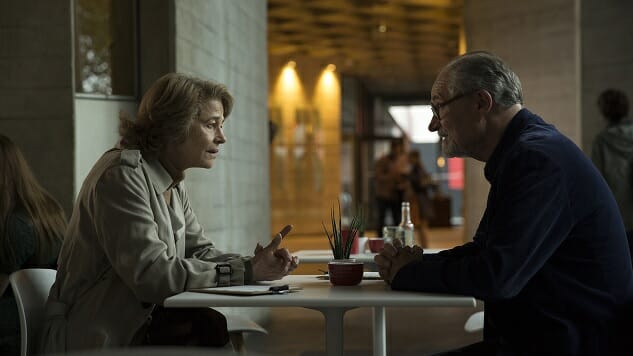
Memory is a funny thing. We are often so certain in the accuracy of our lives’ recollections that we never bother interrogating them, and so when we’re given reason to it feels as though the existential rug is being pulled from under our feet. The realization that we may not have as firm a grasp on our own remembrances as we’d like to think can be traumatic. In The Sense of an Ending, the new movie from Ritesh Batra, that realization can also be cathartic. The film dramatizes the act of confronting and reframing the past as a painful but liberating one, a purging that chafes the soul before soothing it.
Batra, working off of a script by Nick Payne, has adapted The Sense of an Ending from Julian Barnes’ 2011 Man Booker Prize-winning novel of the same name, a brisk tale about the willful distortion of memory. Barnes wrote the book in two parts, beginning in the 1960s before segueing into the 2000s, where the lion’s share of the story unfolds. By contrast, Batra’s film weaves past and present elegantly, seamlessly looping back and forth from one to the other. That architectural shift lends The Sense of an Ending a natural, reflective rhythm on the screen as divorced and crotchety retiree Tony Webster (Jim Broadbent) goes about his daily routine, making brusque small talk with his postman, taking his very pregnant daughter Susie (Michelle Dockery) to birthing classes and running his shop, a vintage camera store with a limited and decidedly ambivalent patronage.
That rhythm is interrupted when Tony receives a letter in the mail, a bequest from the will of Sarah (Emily Mortimer), mother of his first love Veronica (Charlotte Rampling). When Tony goes to claim the items promised him in the letter, he learns that Sarah also left him the diary of his old school chum, Adrian (played in flashbacks by Joe Alwyn), with which Veronica refuses to part. This, understandably, sticks in Tony’s craw, as he, like us, is in the dark: Why did Sarah leave Adrian’s diary to him? What significance does it hold for Tony as an old man? Why does Veronica insist on keeping it out of his hands? You get the sense that Batra wants his viewers to see the diary as a time bomb capable of irrevocably altering the landscape of the film if detonated. He also wants us to accept that its detonation is inevitable.
That probably makes The Sense of an Ending sound more propulsive and melodramatically juicy than it actually is, but then again, if you saw Batra’s last film, the 2013 romantic drama The Lunchbox, you probably know not to expect fireworks from him. Batra is a mellower filmmaker than that, a low-key chronicler of human behavior with endless compassion for his characters—even characters like Tony, who’s more than a bit of a grump but made affable by Broadbent’s innate geniality. Played by another actor, Tony might have been insufferable, but Broadbent’s charm smooths over Tony’s less flattering qualities: his grouchiness, sure, but also his self-absorption and his unwillingness to admit his faults. The Sense of an Ending is about Tony’s long journey down the harrowing path of modesty, humility and self-evaluation to understand that what we might think of as a small, meaningless transgression could have overwhelming consequences for the people we transgress against.
The pleasures of the film lie in its plot intricacies—which suggest innumerable possibilities as to the diary’s contents, each as scandalous as the last—and also its performances, not only by Broadbent and Rampling, but also that of Harriet Walter, playing his endlessly patient and understanding ex-wife Margaret. If Broadbent carries the baggage of his persona as an actor with him into The Sense of an Ending, so too does Rampling, whose presence here may, for some, echo the details of Andrew Haigh’s excellent 2015 film 45 Years, a far bitterer take on similar subject matter to Batra’s and Barnes’. Both are about people whose golden years are shaken up when new revelations are made about their youths, or about the youths of their lovers, and both act as sobering cautionary tales about the dangers of pondering what used to be.
Yet, Batra’s gentle touch softens The Sense of an Ending melancholic edges. It’s a more audience-friendly film than 45 Years, and yet that’s not to say that it’s any less insightful or keenly observant of its characters’ growth. Nostalgia can be hazardous to one’s health, but as demonstrated by Batra, those hazards can also be healing when met with the right demeanor.
Director: Ritesh Batra
Writer: Nick Payne
Starring: Jim Broadbent, Charlotte Rampling, Harriet Walter, Michelle Dockery, Billy Howle, Freya Mavor, Joe Alwyn, Emily Mortimer
Release Date: March 10, 2017
Boston-based critic Andy Crump has been writing about film and television online since 2009, and has been contributing to Paste Magazine since 2013. He writes additional words for Movie Mezzanine, The Playlist, and Birth. Movies. Death., and is a member of the Online Film Critics Society and the Boston Online Film Critics Association. You can follow him on Twitter and find his collected writing at his personal blog. He is composed of roughly 65% craft beer.